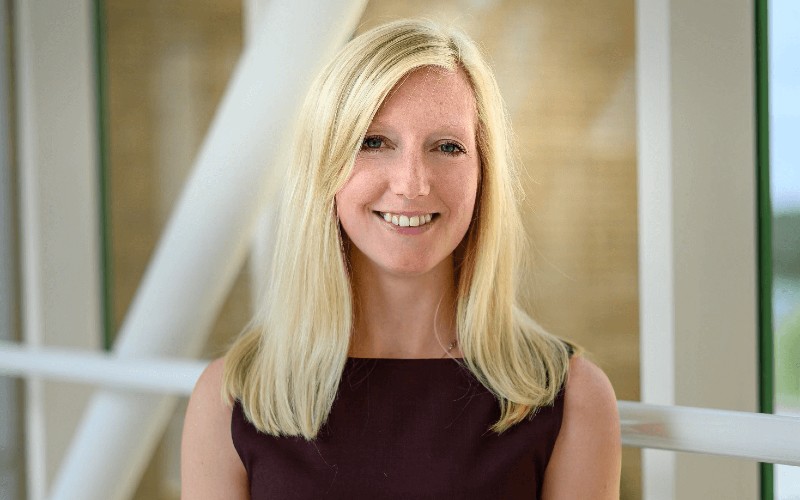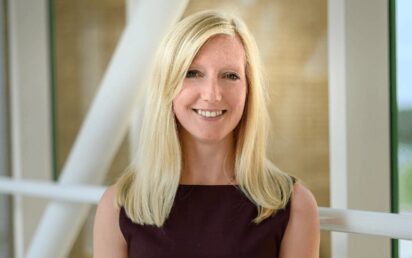As Tiffany Thorn rang the bell to indicate BiVictriX Therapeutics’s entry onto London’s Alternative Investment Market (AIM), the sound could be heard way beyond the Stock Exchange floor.
At 33, Thorn is one of the UK’s youngest CEOs of a publicly listed company. The listing raised £7.5m but the Wigan-raised CEO hopes it’s just the latest stepping stone on her mission to transform the treatment of cancer, and acute myeloid leukemia in particular.
“I don’t fit the physical mould for a CEO or a scientific founder,” she tells TechBlast. “Some people have been somewhat surprised that someone of my age might have been given that position.”
She adds: “People aren’t used to hearing someone with my accent but times are changing. I’ve found it really humbling that, among private investors particularly, there’s almost a benefit of having a slightly different accent. Northern people are known for being very straightforward and genuine.”
BiVictriX Therapeutics has bases in Alderley Park, Cheshire and Wales, well away from the traditional ‘golden triangle’ of drug development in the UK of Cambridge and Oxford – but Thorn has been proving the doubters wrong all her career.
Proud to be from Wigan, she went to Shevington High School and Winstanley College before studying at Lancaster University, where she got a first class honours in biochemistry and biomedicine.
Her grandmother was a hairdresser and she was expected to follow in her footsteps. “I had blonde hair and as your stereotypical little girl from Wigan everyone assumed I’d be a hairdresser,” she says.
Dyslexia
At school, Thorn thinks she had undiagnosed borderline dyslexia as she struggled with reading and writing but excelled in science thanks to the support of one of her teachers.
“I’ve never officially been diagnosed with dyslexia,” she says. “I’m quite competitive and I didn’t want to be labelled with dyslexia. I didn’t want longer times in the exams, I wanted to be given the same time as everyone else. I still struggle with mixing my metaphors.
“I had a fantastic primary school teacher who brought my aptitude for science out. She was a brilliant mentor and I was very close to her.
“When I was about nine she went off sick for a couple of days but then she came out in bruises while she was gardening and died a couple of days later. As a young girl you’ve heard of cancer, but you don’t think it can act that quickly.”
It transpired that her teacher died of an aggressive type of blood cancer called acute myeloid leukemia (AML), which has come to dominate Thorn’s life.
“AML is so aggressive and quick-acting many people succumb to the disease before they’ve been diagnosed with it and it’s something we need to change,” she explains.
Breaking the mould
Thorn’s early love of science was also encouraged by her dad Doug. “I came from an inventor/scientific family,” she says. “There used to be lots of debates between my dad and my brother around the kitchen table, mainly around physics, and I’d try and stay out of it.
“As a young girl I’ve always wanted to make a difference. I certainly wanted to work in healthcare but I also like breaking the mould. I like being different.
“I think everyone had decided because I was a girl I would go down the hairdressing route but I wanted to be different. I put a lot of pressure on myself to be good at science and compete with my brother.”
After university, she joined the NHS and became a clinical immunologist, where her duties included diagnosing and treating haematological malignancies. It was while doing this that she was awarded the chief scientific officer’s ‘rising star’ award for her commitment to the delivery of healthcare.
“If a clinician recorded some suspicious symptoms from a patient they would send us a sample of blood and we would screen it to see if we could identify any abnormal cells,” says Thorn.
“The way we would do that would be to identify these antigen fingerprints that were specific to the cancer that you would not normally expect to see. If you started to see these abnormal cells in patient’s blood you would send it back to the doctor so they could investigate further as a suspicious malignancy.”
It was soon after this that she decided to launch her business – but choosing the name BiVictriX Therapeutics was down to chance.
“The name is quite funny,” she says. “I originally came up with the idea when I was 27 years old. I was sitting in Chester and the Roman name for Chester is Deva Victrix.
“The ‘Bi’ stands for bispecifics, which is the type of drug we’re making. I put it together and got BiVictriX.
“Then I realised that Victrix also means female warrior, so there’s an alternative meaning which I didn’t know at the start.”
Cancer breakthrough
BiVictriX Therapeutics is trying to fix one of the longest-standing problems in cancer treatment.
“It you take antibiotics, for example, they’re targeting a bacteria,” she says. “A bacteria cell is very different to a human cell.
“The problem with a cancer cell is it’s very similar in appearance to a normal healthy cell in the body. Designing the drugs that only target the cancer cells and don’t inadvertently target the healthy cells is the big problem in cancer drug development.
“The Holy Grail is if we can develop drugs that are really toxic but only to cancer cells instead of healthy cells. If we can do that we could reduce the toxicity that patients face – and then we can give higher doses of the drug that would be much more effective without significantly harming the patient in the process.
“At the moment we have to limit the doses we give because of the side effects so it limits the overall effectiveness of the treatment.”
Before the AIM listing BiVictriX had raised £2.3m in investment, including a significant slice from The Development Bank of Wales.
Six months after launching the business, tragedy struck closer to home after her dad was diagnosed with acute myeloid leukemia.
“He was diagnosed because he had back pain, which is a really unusual symptom of AML,” says his daughter. “If he hadn’t had back pain and I hadn’t taken him to A&E the doctor said he would been dead within 24-48 hours. The one message here is if you have any symptoms you must go to your doctor.
“It’s given me a stronger mission than I ever had before. My dad was a really fit 66-year-old when he got diagnosed with this type of leukemia. He was riding his bike every day. Within three weeks of treatment we had to stop because it was causing too many side effects. He was on intensive care for weeks on end. It was devastating to see the effects of treatment on patients.
“Living in fear of these diseases is something that needs to change. It was a sad time but it’s given me the motivation to continue this goal.”
In a bid to accelerate their research, Thorn took the decision to list the BioTech business on AIM.

BiVitriX opens the London Stock Exchange
“We know that what we do is really valued and critical work,” she explained. “We need to stay competitive. We’re a small company working in a really exciting area.
“As soon as we start to showcase our data we expect to see many other pharma companies becoming interested in this area. We need to stay really nimble and competitive.
“Being a listed company has given us really quick access to the funds that we need to accelerate our development to stay competitive in this area while developing these drugs for the people that need them as quickly as possible.
“To stand there at the Stock Exchange, ring the bell and start trading, was a fantastic experience and just a credit to everyone who has helped us get there.”
Despite her success Thorn admitted to suffering from imposter syndrome.
“It keeps you working hard and it keeps you honest,” she says. “I feel incredibly privileged to be given this opportunity. I’m just not fitting the standard model of what someone looks like or sounds like in this role.
“I am trying to use it as a positive and hopefully that will be an inspiration for other young females that might be thinking ‘I’m not good enough to do that’. You have to believe in yourself.”


